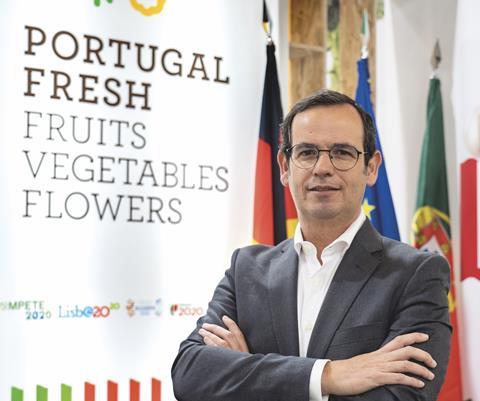Portugal Fresh president, Gonçalo Santos Andrade, says we cannot compromise on food security
Portugal’s fresh produce industry is riding a wave. Exports of fruits, vegetables, flowers and ornamental plants reached a record €2.3bn in 2023, an increase of 11.4 per cent on the previous year, despite contracting 4.9 per cent in volume. Nevertheless, trade association Portugal Fresh acknowledges that its members face major challenges going forward. Like many other countries, climate change and water availability pose a significant risk to future growth – and EU sustainability targets are making an already difficult situation worse.

“Last year’s results reflect more than a decade of investment in international promotion, innovation, technology, and sustainability. They demonstrate that this is a crucial sector for the economy,” Portugal Fresh president Gonçalo Santos Andrade tells Fruitnet.
“Portugal has a privileged location, with a climate that allows us to produce throughout the year. But climate change has had a big impact on production, especially when it comes to access to water and water resources.”
While Portuguese companies have made substantial investments to make more efficient use of water, Andrade explains that public water infrastructure requires substantial renovation to place the sector on a secure footing for the future.
“Some of the infrastructure is over 50 years old and needs upgrading. We must demand the modernisation of distribution systems and the creation of new water reserves, from ponds and reservoirs to dams of different sizes and for multiple uses,” he says.
According to Andrade, water is the most critical issue facing the industry: “Without addressing this issue it is difficult to overcome other goals and gain greater competitiveness.”
At the same time, he believes there needs to be a rethink on EU sustainability targets, which he claims are damaging producers and threatening food supply.
“There is an urgent need for a review of the targets of the European Green Deal and the Farm to Fork strategy. We cannot compromise the EU’s food security. The decrease in European production and increase in imports that we’re currently seeing are simply not sustainable,” he says.
“European farmers are, of course, part of the solution, and every day they seek to improve their working methods, using resources more efficiently. But it must be pointed out that we are already the greatest protectors of the environment and biodiversity. Without active and profitable agricultural activities, lands will be left abandoned, with all the consequences that arise, such as wild fires.”
From a global perspective, Andrade points out that together, the 27 countries that make up the union are only responsible for 6.4 per cent of global greenhouse gas emissions, while Portugal contributes just 0.0115 per cent of the total. “We need to secure substantial commitments from China and the US to achieve a better balance and a collective effort from all geographies,” he says.
“When it comes to greenhouse gases, we estimate that the EU agri-food sector contributes less than 1.5 per cent of global emissions. In order to meet the growing demand for balanced and healthy diets and to produce food for 8.5bn consumers by 2030, we need to have policies that promote an increase in production in the EU, reducing imports from third countries, which are mostly less secure.”



